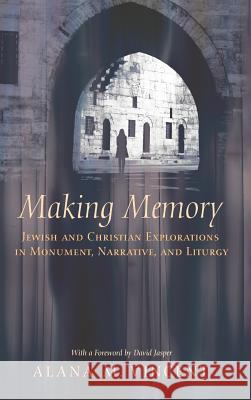Making Memory » książka
Making Memory
ISBN-13: 9781498263375 / Angielski / Twarda / 2013 / 208 str.
Making Memory
ISBN-13: 9781498263375 / Angielski / Twarda / 2013 / 208 str.
(netto: 169,67 VAT: 5%)
Najniższa cena z 30 dni: 176,18
ok. 16-18 dni roboczych.
Darmowa dostawa!
Description: The twentieth century has been called a ""century of horror."" Proof of that designation can be found in the vast and ever-increasing volume of scholarly work on violence, trauma, memory, and history across diverse academic disciplines. This book demonstrates not only the ways in which the wars of the twentieth century have altered theological engagement and religious practice, but also the degree to which religious ways of thinking have shaped the way we construct historical narratives. Drawing on diverse sources--from the Hebrew Bible to Commonwealth War Graves, from Greek tragedy to post-Holocaust theology--Alana Vincent probes the intersections between past and present, memory and identity, religion and nationality. The result is a book that defies categorization and offers no easy answers, but instead pursues an agenda of theological realism, holding out continued hope for the restoration of the world. Endorsements: ""Widely relevant, this compelling and thoughtful book explores the complex phenomenon of remembrance. Combining aesthetical, literary, and theological analyses, Alana Vincent offers a highly original and important contribution to the growing interdisciplinary field that investigates how politics of memory and uses of history shape the relation to the past."" --Jayne Svenungsson, Associate Professor of Systematic Theology, Stockholm School of Theology ""In this rich and well-researched book, Alana Vincent asks] us to join her on a fascinating odyssey in the unruly sea of cultural memory, where we are constantly tossing on waves, alternating between 'remembering' and 'forgetting': to remember for fear that we forget, and to forget lest we remember."" --Jesper Svartvik, Professor of Theology of Religions, Lund University and the Swedish Theological Institute in Jerusalem About the Contributor(s): Alana M. Vincent is Lecturer in Jewish Studies/Academic Advisor to Partnerships at the University of Chester, UK.
Description:The twentieth century has been called a ""century of horror."" Proof of that designation can be found in the vast and ever-increasing volume of scholarly work on violence, trauma, memory, and history across diverse academic disciplines. This book demonstrates not only the ways in which the wars of the twentieth century have altered theological engagement and religious practice, but also the degree to which religious ways of thinking have shaped the way we construct historical narratives. Drawing on diverse sources--from the Hebrew Bible to Commonwealth War Graves, from Greek tragedy to post-Holocaust theology--Alana Vincent probes the intersections between past and present, memory and identity, religion and nationality. The result is a book that defies categorization and offers no easy answers, but instead pursues an agenda of theological realism, holding out continued hope for the restoration of the world.Endorsements:""Widely relevant, this compelling and thoughtful book explores the complex phenomenon of remembrance. Combining aesthetical, literary, and theological analyses, Alana Vincent offers a highly original and important contribution to the growing interdisciplinary field that investigates how politics of memory and uses of history shape the relation to the past.""--Jayne Svenungsson, Associate Professor of Systematic Theology, Stockholm School of Theology""In this rich and well-researched book, Alana Vincent [asks] us to join her on a fascinating odyssey in the unruly sea of cultural memory, where we are constantly tossing on waves, alternating between remembering and forgetting: to remember for fear that we forget, and to forget lest we remember.""--Jesper Svartvik, Professor of Theology of Religions, Lund University and the Swedish Theological Institute in JerusalemAbout the Contributor(s):Alana M. Vincent is Lecturer in Jewish Studies/Academic Advisor to Partnerships at the University of Chester, UK.











